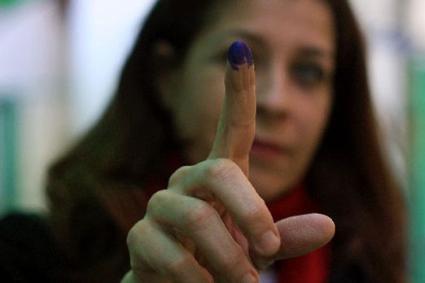CAIRO: Several political analysts consider the March 26 referendum on the constitutional amendments a major turning point in the course of Egyptian politics, one that will determine the future of the entire nation, regardless of the stand voters will take on that decisive day.
For Egyptian taxi drivers, it s a different story.
Cab drivers are perhaps the most heterogeneous group of professionals in Egypt. Most of them drive taxis as a side-job; a source of additional income to cover their basic needs.
Constant inflation, labor unions that fail to provide their members with the appropriate social and medical services, a sense of defenselessness and pessimism towards repressive political conditions and an economic atmosphere that only benefits the rich, haunts every driver interviewed for this article.
Although most of the drivers interviewed were aware of the referendum, none had accurate information about the exact changes and their precise impact. Hardly of them intends to vote and they all hold a firm conviction that the government will ultimately accomplish its always questionable goals whether or not the public consents.
My vote equals nothing, says driver A.A., a public school art teacher. Even if I go and vote, do you think anything will change? The government will do whatever it wants even if the entire country voted no on the referendum.
Ahmed Salah, who holds a BA in commerce, quit his job in a governmental institute which paid him LE 150 a month. When asked whether he s planning to vote on the 26th, Salah shrugged and said he wouldn t as he s busy on that day. He wouldn’t have voted in any case because, simply, he doesn t care.
I have a college degree and yet I m forced to drive a car that I don t even own with an income that will never allow me to get married and lead a decent life, he said. The government has never supported me; always failed promises without any actual results.
You know what, he continued, If I m called to serve my duty in the army for some war someday, I ll join the army, but I won t fight. I don t have a single reason to do so.
On the other hand, Ahmed El-Ansary, who comes from the Upper Egyptian governorate of Sohag, will not vote since he believes that boycotting is the only viable approach by which he can face up to the government.
This referendum is a charade. All intellectuals and men of honor are boycotting the elections and that s the only sensible thing to do now, he said. I refuse to be the government s puppet. Let them go to hell with their constitution, he added.
Conspiracy theories always abound among Egyptians in general, and taxi drivers in specific. Mohammed Saeed is completely convinced that the authorities are maximizing their efforts to distract Egyptians from the imperative issues that occupy the nation.
Look at those young girls with skimpy clothes stuffing the streets of Cairo, he shouted. That s the work of the government. It represses everything in the country, why are they letting these girls loose then?
None of the interviewed drivers have any doubt that the change of constitution will grant more power to Mubarak, whom they believe possesses excessive authority already.
When will he get enough? Alaa Mahmoud from Giza wondered. The man enjoys every line of authority there is; he s the head of every body of authority in this country for God s sake.
The most intriguing personality interviewed for this article though is a low-ranking police offer named Khaled Shaaban who wasn t aware of the referendum or its projected significance. With or without a referendum, Shaaban deems the government to have sufficient control to carry out any extreme measures it wishes too.
The government can violate your home and you can t really do anything about it, he said. Those in power are robbing the country blind and all you can do is comply or else you re going to end up in jail.
Although Shaaban practically speaking is part of the government, he considers himself, above all, an ordinary member of the public who despises the government and its head as much as the rest of the nation.
I hate my job because I don t think what I do is right. I m dealing with the same problems as anyone else and I feel just as helpless, said Shaaban. We reached a point in this country where no ordinary citizen dares to speak his mind without calculating the consequences of every word.
Nothing s going to change now, reform or no reform, he said. The government will always have the upper hand. We need a miracle to save us from what s going to happen in the next few years.



